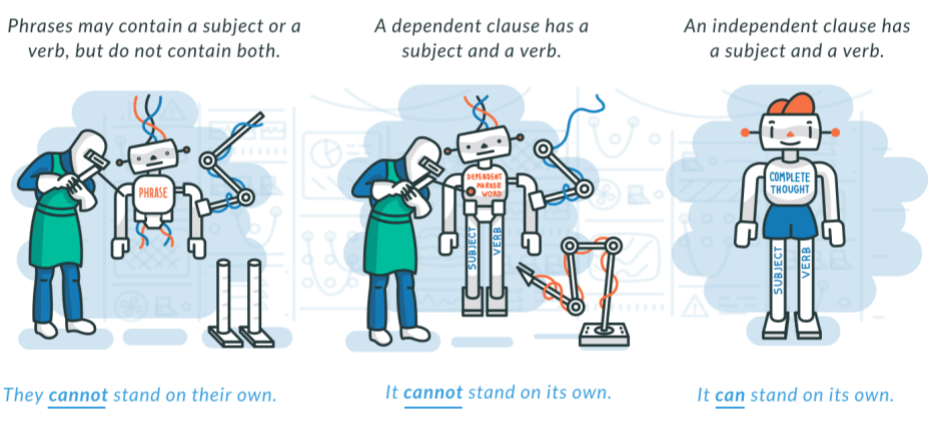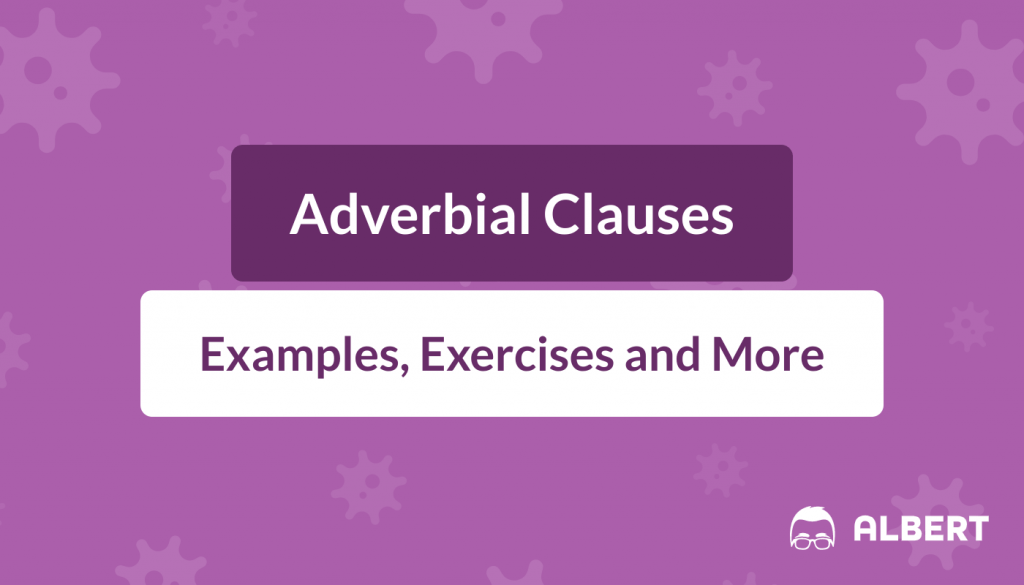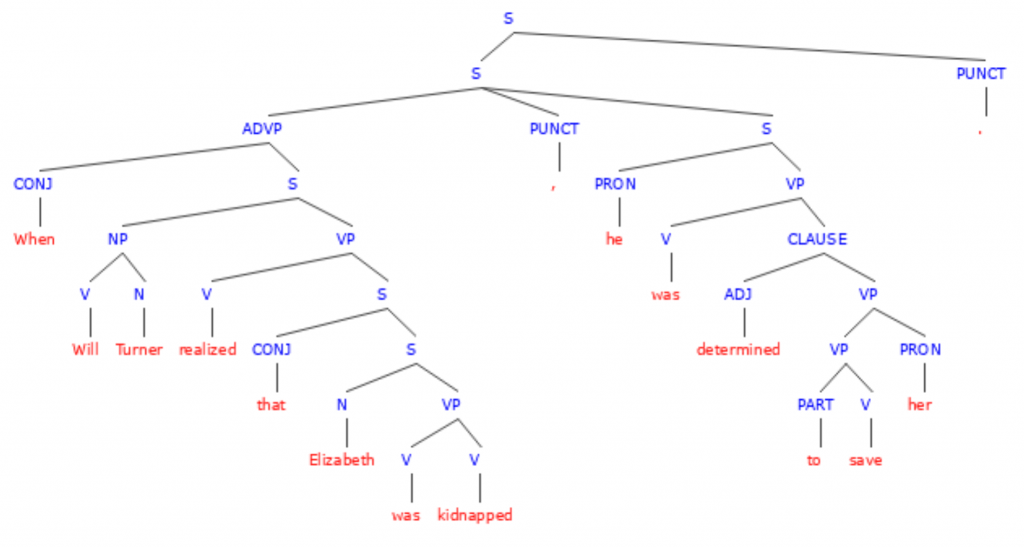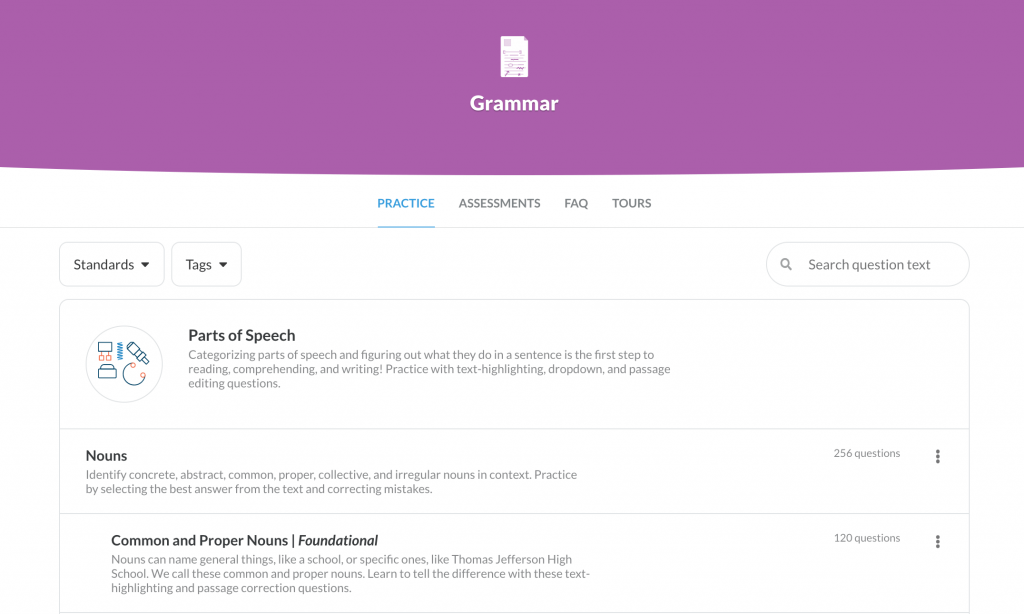There are three types of dependent clauses: noun clauses, relative clauses, and adverbial clauses.
While noun clauses can replace any noun in a sentence, relative and adverbial clauses modify words already in the sentence instead of replacing them.
Noun clauses are dependent clauses that can replace subjects, objects, or subject complements in sentences. These clauses start with either interrogative pronouns or expletives.
For example:
- Rafiki encouraged Simba to remember who he was.
In this sentence, the noun clause, who he was, is acting as an indirect object of the verb, encouraged.
Relative clauses are dependent clauses that modify or give more information about a noun in the independent clause.
For example:
- The lime green suit that I bought in Paris looks stunning on him.
In this sentence, the relative clause that I bought in Paris modifies the subject, suit, by identifying which suit is being referred to by the speaker.
Additionally, adverbial clauses are dependent clauses that modify or give more information about a verb in the independent clause.
For example:
- After the storm passed, we went outside to survey the damage.
In this sentence, the adverbial clause after the storm passed modifies the verb went by showing when the action of the sentence took place.
For this post, we will focus on adverbial clauses, but you can learn more about noun clauses and relative clauses on the Albert blog. When you’re ready, test yourself with a quiz and practice with our high-quality, standards-aligned questions here.
What We Review
The Basics of Adverbial Clauses

What is an Adverbial Clause?
An adverbial clause is a dependent clause that modifies the main verb in the independent clause. Adverbial clauses always start with a subordinating conjunction and must connect to an independent clause to make sense.
For example:
- Even if I take the train, I still might be late to my appointment.
In the example above, the adverbial clause even if I take the train modifies the verb phrase, might be late by answering the question, “how?”.
What are the Four Types of Adverbial Clauses?
Adverbial clauses modify the main verb of the independent clause by answering one of four questions: where, when, how, and why.

Below are examples of specific subordinating conjunctions being used to answer each question within an adverbial clause.
1. Where
The subordinating conjunctions where or wherever can both be used at the beginning of dependent adverbial clauses to answer the question, where.
For example:
- Wherever Mary went, the lamb was sure to go.
In this example, the adverbial clause gives us the location of Mary’s lost lamb.
2. When
Subordinating conjunctions such as after, as soon as, before, now that, once, till, until, and while begin the adverbial clause and modify the verb by showing when the action of the independent clause occurred.
For example:
- You may have dessert as soon as you finish your dinner.
In the sentence above, the adverbial clause lets us know the time frame for dessert.
3. How
Adverbial clauses can also begin with subordinating conjunctions that answer the question, how?, and some of these conjunctions are as, as far as, as if, as long as, as though, insofar as, in that, lest, no matter how, provided that, and unless. Often these types of conjunctions imply some sort of condition on the verb, as if the action of the sentence is contingent on what is outlined in the dependent clause.
For example:
- I will watch that movie with you as long as you promise that I will not get bored.
In this sentence, the speaker agrees to an action, “watching a movie” on the condition that it is not a boring movie.
4. Why
Lastly, adverbial clauses can also express why the action of the sentence happens, and these clauses do so by using one of the following subordinating conjunctions: because, even if, even though, in case that, since, so that, and why.
For example:
- Since I trust you to take care of it, we will adopt a dog today.
The adverbial clause in the sentence above explains why the speaker has chosen to adopt a dog.
Return to the Table of Contents
3 Tips for Understanding Adverbial Clauses
Here are some important tips to help you understand adverbial clauses:

Tip #1. Adverbial clauses always start with a subordinating conjunction
For example:
- Although I may never reach the top, I will still attempt to climb Mount Everest.
In the example above, the dependent adverbial clause expresses a condition that the action of the sentence (climbing Mount Everest) is dependent on.
Tip #2. Adverbial clauses always modify verbs
For example:
- She stepped confidently across the tightrope as if she had done it many times before.
In the sentence above, the adverbial clause modifies the verb stepped by describing “how” the subject walked the tightrope.
Tip #3. Adverbial clauses that come before the subject must be separated from the rest of the sentence through the use of a comma
For example:
- Even though I have never tried a funnel cake before, I think I would like it.
- I think I would like a funnel cake even though I have never tried one before.
In the two examples above, a similar adverbial clause both begins and ends two different sentences. In the first example, a comma must be used to separate the adverbial clause from the rest of the sentence. Writers do this to draw readers’ attention to the subject of the sentence as well as to let them know that the adverbial clause is just an introduction to the most important part of the sentence.
Return to the Table of Contents
Applying the Basics: Adverbial Clause Review & Practice
Now that you understand how adverbial clauses function in sentences, review the anchor chart below and complete the review to fully understand how to use and recognize these clauses.
The Ultimate List of Clauses
Refer to the graphic below to learn the different types of Clauses:
This list, obviously, does not include all possible examples of clauses; however, it is meant to be used as a guide while identifying sentence clauses.
Adverbial Clauses Exercises and Review
Now that you know how to identify adverbial clauses, test your ability to find these in sentences.
Select the adverbial clause(s) in the sentences below. Remember, an adverbial clause modifies the verb in the independent clause, and an adverbial clause always starts with a subordinating conjunction.
1. When Will Turner realized that Elizabeth was kidnapped, he was determined to save her.
In this sentence, when Will Turner realized that Elizabeth was kidnapped is an adverbial clause that explains when Will Turner was determined.
2. Jack Sparrow did not understand why Captain Barbossa thanked him until he realized that the monkey was also named “Jack”.
In this sentence, the adverbial clause until he realized that the monkey was also named “Jack” modifies when Jack Sparrow’s confusion cleared.
3. The pirates turned to skeletons in the moonlight because they were jinxed by an old Aztec curse.
In the sentence above, the adverbial clause because they were jinxed by an old Aztec curse answers why the pirates morphed into skeletons.
Pro tip: Remember, adverbial clauses always modify the main verb in the independent clause.
For additional practice, check out Adverbial Clauses content on Albert.
Return to the Table of Contents
Try for Yourself: Adverbial Clauses Quiz

Feeling confident in your understanding of Adverbial Clauses?
Take this short six-question quiz to see what you’ve learned:
1. Does an adverbial clause modify a noun or a verb in the independent clause?
- Answer: Verb
- Correct Explanation: That’s right! Adverbial clauses can only modify the main verb in the independent clause, while relative clauses can modify any noun in the independent clause.
- Incorrect Explanation: Sorry, that’s not right! Remember, adverbial clauses can only modify the main verb in the independent clause, while relative clauses can modify any noun in the independent clause.
2. If an adverbial clause appears at the end of a sentence after the main subject and verb, is a comma needed to separate the clause from the rest of the sentence?
- Answer: No
- Correct Explanation: That’s right! Adverbial clauses only need a comma if they come before the main subject and verb and act as an introduction.
- Incorrect Explanation: Sorry, that’s not right! Remember, adverbial clauses only need a comma if they come before the main subject and verb and act as an introduction. If they come at the end of the sentence, no comma is needed.
3. In this sentence, is the underlined clause a relative clause or an adverbial clause?
If I am feeling better by this evening, I will attend the party.
- Answer: Adverbial Clause
- Correct Explanation: That’s right! The underlined clause is an adverbial clause because it describes the condition or how the subject will attend.
- Incorrect Explanation: Sorry, that’s not right! Remember, adverbial clauses modify verbs while relative clauses modify nouns.
4. In this sentence, is the underlined clause a relative clause or an adverbial clause?
The roller coaster that we rode yesterday gave me a headache.
- Answer: Relative Clause
- Correct Explanation: That’s right! The underlined clause is a relative clause explaining which roller coaster made the speaker’s head hurt.
- Incorrect Explanation: Sorry, that’s not right! Remember, adverbial clauses modify verbs while relative clauses modify nouns.
5. In this sentence, is the underlined clause a noun clause or a relative clause?
I do not know where I put my keys.
- Answer: Noun Clause
- Correct Explanation: That’s right! The underlined phrase is a noun clause because it replaces the noun direct object of the verb, know.
- Incorrect Explanation: Sorry, that’s not right! Remember, relative clauses modify nouns while noun clauses can replace any noun in a sentence.
6. In this sentence, is the underlined clause a noun clause or an adverbial clause?
The abandoned treehouse seemed eerily familiar as if she had seen it sometime before.
- Answer: Adverbial Clause
- Correct Explanation: That’s right! The underlined clause is an adverbial clause because it begins with a subordinating conjunction and modified the verb phrase, seemed eerily familiar by explaining why the speaker recognized the tree house.
- Incorrect Explanation: Sorry, that’s not right! Remember, adverbial clauses modify verbs while noun clauses can replace any noun in a sentence.
For additional practice with Adverbial Clauses, check out our practice on Albert: Adverbial Clauses.
Return to the Table of Contents
Teacher’s Corner for Adverbial Clauses
Many of our students understand that some words modify nouns while others modify verbs. It becomes much trickier when entire clauses modify these same nouns and verbs. When our students understand how to recognize these different types of clauses and feel confident using adverbial clauses in their writing, we will see drastic differences in the quality and voice of our students’ work. Suddenly, the all-too-common simplistic sentences transform into something much more eloquent through the implementation of these clauses.
For specific standards on the different types of clauses, including adverbial clauses, check out the Common Core State Standards website.
Albert’s Adverbial Clause Practice is helpful in conquering student’s fear of these often confusing clauses by providing ample practice questions. Even if students choose incorrectly, Albert provides thorough explanations to help address student confusion in the moment. Additionally, Albert also provides grammar assessments that can be used to gauge student understanding before, during, or after these practice assignments.
Return to the Table of Contents
Summary for Adverbial Clauses
Adverbial clauses are dependent clauses that modify the main verb. Adverbial clauses always start with a subordinating conjunction and must connect to an independent clause to make sense and create a complete sentence.
Adverbial clauses answer one of four questions: where, when, how, and why.
Be sure to check out our grammar course for more Dependent Clause practice.
You can also access over 3,400 high-quality questions that address nearly every grammatical concept.
Need help preparing for your Grammar exam?
Albert has hundreds of grammar practice questions with detailed explanations to help you master concepts.











